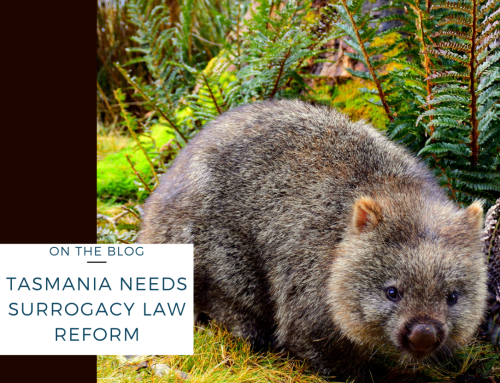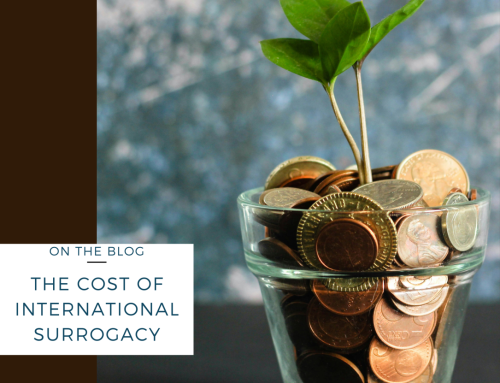Feminism and surrogacy.
Feminist beliefs include that a woman has the right to full bodily autonomy. That includes reproductive autonomy; the right to determine if and when she has children, how many, and the right to make decisions about her fertility and reproduction. I am a surrogate and an intersectional feminist. My feminism crystallised when I became a mother to two boy children. I was confronted with my privilege as a white person, and the disadvantage I experience as a woman, and reflected on the different experiences my two white sons were likely to have in their lifetimes.
I exercised my bodily autonomy to assist people with the donation of my eggs, and as a surrogate. The decision was discussed with my partner – not because he could tell me what to do, but because we are a team and it was a team decision. The idea that anyone could tell me what I could do with my body, or my genes for that matter, is offensive to me.
I believe everyone with a uterus should have the right to decide whether to carry a baby, either for themselves, or for someone else.
As a privileged woman with good fertility and health, I wanted to help to ‘level the playing field’ for someone without my privilege. This might have influenced my decision to carry for a gay couple in the middle of the marriage equality debate in Australia. Certainly, I have felt very lucky to have been able to make reproductive decisions without many barriers, unlike many gay men, and women suffering infertility.
Some people who claim to be feminists, are highly critical of all forms of surrogacy. Radical feminists are also transphobic and anti-sex work. Often the same rhetoric is applied to arguments against surrogacy.
I have considered their arguments and reflected on my own experience as a surrogate, and as a surrogacy lawyer. While I don’t agree with much of the criticism, I have reflected on how I can help promote best practice surrogacy in Australia, and educate people to make empowered, ethical decisions about international surrogacy.
In 2025, the United Nations Special Rapporteur published a report calling for a global prohibition against surrogacy. The call for prohibition denies women’s rights to make reproductive decisions for themselves, including to become a surrogate for someone else.
Arguments against surrogacy can be summarised below:
- Surrogacy is human trafficking. Some criticisms against surrogacy include that surrogacy is human trafficking. We should be concerned with exploitation of women and children, and some surrogacy involves ‘traveling surrogates’ which is justifiably likened to human trafficking. To safeguard against human trafficking, we should regulate surrogacy to make sure surrogates are provided with access to legal advice and counselling and can provide informed consent.
. - Surrogacy commodifies women’s bodies. Some critics claim that surrogacy is like sex work and that it commodifies women’s bodies for someone else’s purposes and benefit. Again, we should be concerned with exploitation of women’s bodies. But we should also recognise that adult women are capable of making decisions for their bodies – whether to engage in sex work or surrogacy and regulate the industries around them to make it safe.
.
Surrogacy arrangements in Australia are not enforceable, and a woman retains her right to autonomy. This is a safeguard against exploitation because the surrogate cannot be forced to undergo medical treatment she does not agree to, nor adhere to lifestyle standards decided by the intended parents.
.
Women have a right to determine what they do with their bodies, and this includes surrogacy and sex work. Feminists should be happy for empowered women making empowered choices that are right for them. Stigmatising, or criminalising sex work or surrogacy, does not safeguard women’s rights.
. - There is no right to a child; people who are unable to conceive or carry a child themselves must reconcile themselves to being child-free. I agree that no one has a right to a child and we should challenge societal expectations that everyone should have children in order to be happy and fulfilled.
.
While I don’t believe anyone is entitled to a child, I still carried a baby for a couple who wanted one. I maintain that I have the right to bodily autonomy and reproductive autonomy, and the rights of the child were maintained as paramount. The baby I birthed is well-looked after, loved and cared for, and we as a society have generally accepted that children can be raised by two dads without any detriment to their well-being. My main focus, and that of her parents, is always for her well-being and her sense of self. She will always have a relationship with me, and my children, and I will support her interests by being available to her when and if she needs.
.
No one has a right to a child – but women have the right to carry a child and not want to raise it. We have a right to be surrogates, if we choose to be, and to relinquish the child for someone else to raise.
. - The erasure of the mother. This criticism suggests that only the birthing woman can fill the role of mother. Research shows there to be primal connections between a woman and the baby she carried – and as someone who gave a baby to another couple, I can attest to this being true. I felt a connection with the baby I carried, and maybe that’s because we share genetics and she looks like me and my family members. I can, however, also confirm that carrying and birthing her did not may me want to be with her or to parent her. She was conceived with the intention of her being raised by her dads, and I felt 100% happy and satisfied doing this.
.
I’ve heard some criticism that giving away a baby somehow undermines motherhood, and the role of mothers. I think this is reductive, and buys into the Hallmark card version of motherhood. It also presumes that only mothers are capable of caring for children. I’ve written more about this and challenges the idea that women are made to be mothers or that children only thrive with their mothers.
.
Cancelling the critics
We may never reconcile the criticisms of surrogacy with the reasons why we do it. I recognise that those critics will never convince me that all surrogacy is evil, and I will never convince them of how amazing it can be. My version of feminism seeks to empower women to make empowered decisions, and anyone that seeks to deny this right is not a feminist in my book.
Some critics of surrogacy rely on anecdotal evidence of a few women who had poor surrogacy experiences. It would be fantasy to assume that all surrogacy is good and all outcomes are positive. It is disappointing that a few stories should serve to promote the abolition of surrogacy altogether, or to bolster the opinions of those who claim we are all being exploited. I am not looking at surrogacy through rose-coloured glasses; I know that most surrogacy is imperfect, and that we can all do more to make it better.
The rights of the child should always be paramount, and surrogates must maintain bodily autonomy if we are to protect the integrity of surrogacy arrangements. Ultimately, it is the right of every woman to determine whether she carries a baby for someone else, and we should provide an appropriate framework to ensure her rights are protected. Abolishing surrogacy is not the answer; regulation is the key.
If you are new to surrogacy, you can find our more about the process by reading the Surrogacy Blog, downloading the free Surrogacy Handbook, and listening to the Surrogacy Podcast.
I’ve written a book, More Than Just a Baby: A Guide to Surrogacy for Intended Parents and Surrogates, which you can purchase in paperback and electronic versions.








